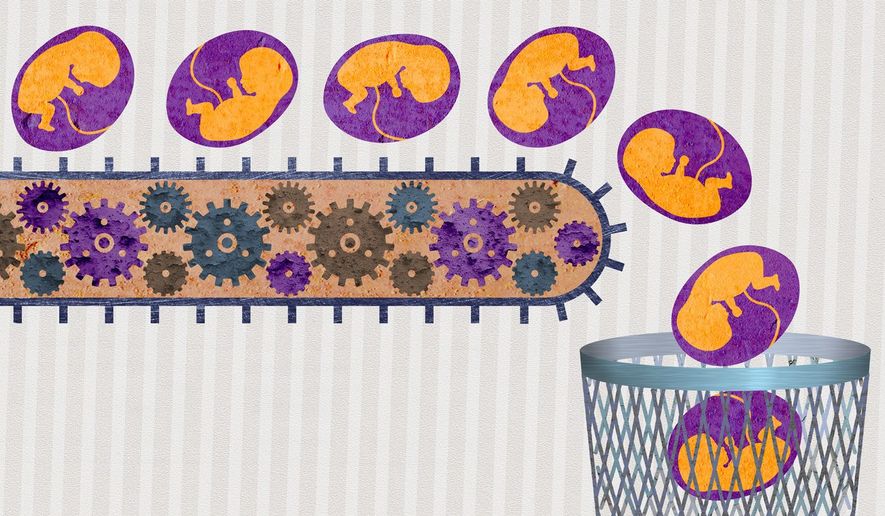OPINION:
Dr. Francis Collins has not shown any pro-life leadership at the National Institutes of Health (NIH). In fact, in an interview, Dr. Collins’ response to a congressional letter outlining pro-life members’ concerns dripped with condescension, implying that the group of 41 congressmen understood neither the science nor the ethics of embryo and stem cell experiments. Dr. Collins owes us an apology. We know the science, use the scientifically accurate terms and know the ethical facts. Dr. Collins’ positions at NIH have not been pro-life.
His lack of pro-life leadership might have been expected when he served under the previous administration, which was the antithesis of pro-life. However, now Dr. Collins has agreed to work for President Trump, who campaigned on a pro-life agenda. Will Dr. Collins change his positions and adjust his agenda? When will we have a pro-life NIH Director who reflects the policy of our president?
As one example of the void in pro-life leadership, Dr. Collins designed and oversees the NIH registry of human embryonic stem cell lines, a listing of cells — created by destroying young human embryos — that are eligible for hundreds of millions in federal taxpayer dollars. Dr. Collins continuously approves cells for this registry, and did so most recently in March and again in June of this year.
The registry has created a cottage industry for those who want to destroy human embryos and then reap taxpayer dollars for their efforts. The establishment of the registry created an incentive for further destruction of young human embryos, under the guise of expanding scientific research and providing more “experimental material.” Dr. Collins called it “important, life-saving research,” despite the fact that embryonic stem cells have to this day not saved a single human life nor proven to have any near-term success in patients.
Eight years after its inception, the registry is nothing more than an embryonic charnel house. The stem cell lines sit as names and numbers on the registry, memorial markers to the lives of the human embryos destroyed in the name of science.
Moreover, scientific leaders admit that human embryonic stem cells now serve primarily as references to compare with nonembryonic stem cells in the laboratory. Induced pluripotent stem (iPS) cells, which show the same characteristics as embryonic stem cells, have largely replaced embryonic stem cells. The Nobel-prize-winning iPS cells can be made from virtually any person or tissue, healthy or diseased, more cheaply and efficiently than embryonic stem cells, without destroying the donor of the cells.
After consuming a decade and a half of federal funding, amounting to well over a billion taxpayer dollars, embryonic stem cell research has produced no help for patients. The stem cell registry at NIH and federal funding for it should be foreclosed, and the funds should be redirected to research that shows real hope for patients.
In previous interviews, Dr. Collins has ignored the gold standard of stem cells for patients: adult stem cell research. Adult stem cells have now treated well over 1 million patients around the globe, including tens of thousands of children. Adult stem cells are the only stem cell option to show authenticated, life-saving success in patients, validated by hundreds of scientific publications.
Yet in a 2009 interview, Dr. Collins touted “the one clinical trial approved” by the FDA at the time — a single trial that showed no benefit to any patient from embryonic stem cells, even to today — and ignored over 2,000 adult stem cell clinical trials ongoing at the time (the number of adult stem cell trials now exceeds 3,000). Adult stem cell research is providing real innovation for patients now, and it could use the funding that now goes to dogmatic support for antiquated science. Will Dr. Collins voice his support for adult stem cell research and redirect funding toward patient-focused science?
The House of Representatives has shown tangible support for this idea with the introduction of H.R. 2918, the Patients First Act of 2017. The bill would direct HHS to prioritize adult stem cell research that has the best chance of producing near-term benefits in patients without the creation, destruction, or risk of injury to human embryos. Furthermore, the bill advocates for the ethical approach without authorizing any additional spending.
In addition to refusing to acknowledge the potential of adult stem cell research, Dr. Collins has also supported human cloning to create embryos for experiments. In this scenario, a cloned human embryo would not be allowed to survive and develop, but rather be torn apart for the use of its cells in laboratory tests. Cloning (technically termed somatic cell nuclear transfer) requires the transfer of a cell nucleus into an egg that has had its own nucleus removed. This is the way Dolly the cloned sheep and other cloned animals all began, as cloned embryos.
Yet Dr. Collins takes the unscientific view that a cloned embryo is not really an embryo, because, he says, it was not produced by a sperm and egg coming together. Even the NIH states that the cloning process produces an embryo.
The NIH can be a world leader in successful, ethical science and medicine. But this shift requires a pro-life leader at the helm.
• Jim Banks is a U. S. representative from Indiana. David A. Prentice is vice president and research director at the Charlotte Lozier Institute, the research and education arm of the Susan B. Anthony List.




Please read our comment policy before commenting.